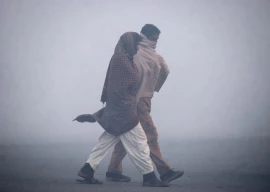
Indus River System Authority (Irsa) has delayed its much-awaited assessment of water availability for the upcoming crop season, a move that leaves Sindh and Punjab growers in the dark about whether they will be able to start sowing on time.
Irsa’s technical committee has decided to meet again on March 26 – six days before the start of Kharif season – to assess the water availability with official pinning hopes that river inflows would improve due to melting of glaciers.
Glaciers usually melt around this time of the year and provide enough water supply for the upcoming crop season, however, the recent cold wave lasting halfway through March has prevented this natural phenomenon from happening this year.
While analysing the water availability for the upcoming crop season that starts on April 1, the committee decided that as the temperature levels in the catchments are not promising, an accurate measurement of water flows could not be measured. It was decided that based on the flows of March 20, another meeting will be convened on March 26, to measure the anticipated flow levels with more accuracy.
Growers of Sindh and Punjab feel that crops at the start of Kharif season will suffer a setback in production because of water shortage. Cotton, sugarcane and paddy are the major crops of Kharif season. Cotton may be affected the most affected as late sowing may result in pest attacks.
Irsa member on the condition of anonymity said that Sindh and Punjab may face a water shortage of 15 to 25 per cent from April to June 2012, the start of the season.
This brings the overall water shortage of 5 to 10 per cent for the entire Kharif season, official said.
Record snowfall at glaciers will ensure smooth supply of water for Kharif season, once they start melting, official added.
Meanwhile, the meeting held on Friday also categorically contradicted media reports about water shortage of 50% to 70% in the upcoming crop season.
While reviewing the water situation, the committee showed satisfaction on the standing wheat crop and said that although water storage in reservoirs is near zero level, the available river supply in western rivers – Indus, Kabul, Jhelum and Chenab – is about 45,000 cusecs to 50,000 cusecs per day which is sufficient to meet the prevailing demands of fodder, sugarcane, vegetables, orchards and drinking water.
Irsa member also ruled out any tension between Punjab and Sindh over water theft. “We have built trust between two provinces over water loss issue,” Irsa member said.
Published in The Express Tribune, March 17th, 2012.

1726117332-0/Megan-Thee-Stallion-(1)1726117332-0-165x106.webp)





















COMMENTS
Comments are moderated and generally will be posted if they are on-topic and not abusive.
For more information, please see our Comments FAQ